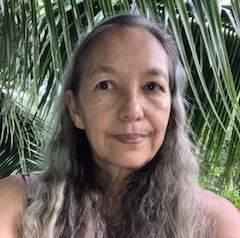
“Freedom to Be”: An Event to Explore Indigenous Spirituality and the Environment
Freedom to Be: Perspectives on the 2022 UN Report on Indigenous Peoples and the Concept of Freedom of Religion or Belief
Wednesday, December 6
3 p.m. (New York) | 10 a.m. (Honolulu)
ONLINE
On Wednesday, December 6 at 3 p.m. EST, join the Center for Earth Ethics for Freedom to Be, a conversation about the intersection of Indigenous issues, the concept of freedom of religion or belief, and the climate crisis. This virtual discussion will feature Indigenous voices who will explore how international Indigenous communities are affected by the same extractionist industries, domination mindset, and land removal policies that drive climate change.
Confirmed speakers include Pavel Sulyandziga of the Udege people in Russia, Laulani Teale of the Kanaka Maoli people in Hawai’i, and Åsa Larsson Blind of the Sámi Peoples in Sweden. Roberto Múkaro Borrero, strategic advisor to CEE, will moderate. CEE Executive Director Karenna Gore will introduce and close the program.
The conversation will investigate how Indigenous spirituality’s intrinsic connection to the environment and earth can support an ecologically balanced future.
This conversation is another in a series of CEE events that build off the 2022 report on Indigenous communities by the United Nations Special Rapporteur on Freedom of Religion or Belief.
Confirmed Speakers

Åsa Larsson Blind is vice-president of the Sámi Council, of which she has been a member since 2008, having served as president from 2017 to 2019. She was the first woman to chair the National Sámi Association in Sweden, serving from 2019 to 2021. Between 2011 and 2015, she represented the Sámi Council at the Indigenous Peoples’ Secretariat, while also serving as the Head of Department for the Sámi Council at Senior Arctic Officials (SAO) council meetings. She has been active in several Sámi organizations in Sweden, including the National Sámi Association (2007-2011), the Sámi Educational Center in Jokkmokk (2007-2009), and Sáminuorra, the Sámi youth organization (2002-2007). Larsson Blind was born and raised in a reindeer herding family and holds a Master’s Degree in Human Resources Management and Development from the University of Umeå.

Pavel Sulyandziga is the founder and president of the Batani Foundation, an Indigenous rights organization representing the Indigenous peoples of the Russian Far East. In the late 1980s, he became a leader of the Udege people. Between 2001 and 2010 he served as the first vice-president of the Russian Association of Indigenous Peoples of the North (RAIPON). Between 2005 and 2010 he performed duties as a member of the UN Permanent Forum on Indigenous Issues and was a member of the UN Working Group on Business and Human Rights between 2011 and 2017. He holds a Ph.D. in Economics from the Institute of Economics of the Russian Academy of Sciences.

Laulani Teale is the coordinator of Hoʻopae Peace Project. She is an Indigenous Kanaka Maoli peacemaker, activist, musician, teacher, artist and writer. She is culturally trained in laʻau lapaʻau (traditional herbalism) and hoʻoponopono (traditional peacemaking), specializing in Indigenous health issues related to activism and colonization. She has been a front-line activist in major Kanaka struggles and serves the Kanaka movement in many capacities. She is a cultural bard and haku mele (songwriter), training under Liko Martin, a master bard and long-time force in the Hawai’ian movement. She is a spiritual practitioner involved in the hands-on restoration and protection of sacred places and waters, as well as a minister and birth worker, protecting and reviving religious practices of birth, death, healing, aloha ‘āina (love for the land) and sovereignty. She holds a master’s degree from the University of Hawaiʻi School of Public Health.

Roberto Múkaro Borrero is a long-time advocate for the rights of Indigenous Peoples, a chief of the Guainía Taíno Tribe, president of the United Confederation of Taíno People, and a special advisor for the Center for Earth Ethics. He has a distinguished and diverse background in policy and program development, and human rights advocacy, including a specialization on the rights of Indigenous Peoples. He has more than 25 years of experience actively engaging the United Nations system in thematic areas such as sustainable development, climate change, the Information Society and the Organization of American States. He served on the staff of the International Indian Treaty Council and the American Museum of Natural History and was a consultant for UNESCO, UNDP, UN Permanent Forum on Indigenous Issues and PBS. A published writer, an accomplished artist and musician, he is a member of the Taíno Tribal Nation, an Indigenous people whose traditional homelands extend through the Greater and Lesser Antilles to the southern tip of Florida. In 2012, he was traditionally sanctioned a kasike (chief) of the Guainía Taínotribal community. He has an educational background in communications and cultural studies. In 2013, Borrero was awarded an honorary doctorate in humanities from Kayiwa International University, Kampala, Uganda.

Karenna Gore is the founder and executive director of the Center for Earth Ethics at Union Theological Seminary in New York. Karenna formed CEE in 2015 to address the moral and spiritual dimensions of the climate crisis. She is a visiting professor of practice of earth ethics at Union Theological Seminary, an ex officio faculty member of Columbia University’s Earth Institute, and an expert in the United Nations’ Harmony with Nature Knowledge Network. She serves on the boards of the Association to Benefit Children, Pando Populus, the Sweetwater Cultural Center, and Riverkeeper.
